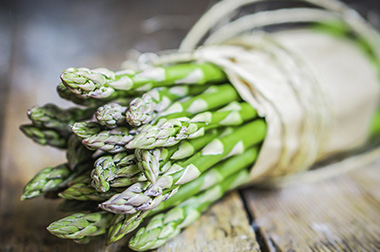 Take a look at asparagus and you’ll see why they call the stalks “spears.” Shaped like mini javelins, it’s a fun coincidence how a bunch of asparagus can fight off health risks.
Take a look at asparagus and you’ll see why they call the stalks “spears.” Shaped like mini javelins, it’s a fun coincidence how a bunch of asparagus can fight off health risks.
Flavor: nutty and yummy. Texture: from crunchy to creamy, depending on how you cook it. Spring is the perfect time to try new things with this in-season superfood, asparagus!
Packed with Nutritional Punch
Fresh asparagus is not only a delicious savory treat, it is loaded with nutrients. Topping the list is folate (Vitamin B9) which is a boon in growth periods (such as pregnancy, infancy and adolescence), contributing to DNA and RNA production as well as formation of blood cells in bone marrow.
You’ll also get Vitamins A, C, E and K from your serving, as well as the trace mineral chromium. Chromium is important because it helps insulin transport energy in the form of glucose to your cells. Asparagus is rich in dietary fiber, too.
Anti-Aging and Anti-Oxidizing
In terms of antioxidant qualities, asparagus is one of the top veggies you can eat. Antioxidants help neutralize cell damage, which contributes to the aging process.
Another anti-aging property of this perky spring vegetable is its ability to help preserve cognitive function as a healthy source of folate. In other words, it’s is great for your brain. Like leafy greens (which also are in season in early spring), asparagus provides folate, which works in conjunction with Vitamin B12 (found in most animal proteins like meat and fish) to slow down the rate of cognitive impairment, especially in older adults.
Delightfully Detoxing
Think green in spring and include asparagus at the top of your list of “herbaceous” plants that provide a rich source of the detoxifying compound known as glutathione. As with kale and Brussels sprouts, eating asparagus can help protect you against certain forms of cancer with high levels of glutathione which breaks down cancer-causing free radicals.
Another benefit from the mighty spears of spring: the amino acid called asparagine, a natural diuretic. Diuretic properties tend to increase urination, which releases undesirable trapped fluids in the tissues, and can rid the body of excess salts. This is especially important to edema patients, who swell from retained fluid, and also may benefit those suffering from high blood pressure and diseases of the heart.
Grilled Asparagus with Tomatoes and Goat Cheese
One of the best things about asparagus, besides its unique taste and amazing health benefits, is how quickly it cooks and how easy it is to prepare. In spring, when it’s even more affordable because it’s in season, you can make asparagus the star of your meal.

We hope you enjoy this recipe, which was adapted from several sources including Cooking Light magazine.
Ingredients
- 1 lb. asparagus trimmed
- 1 teaspoon extra-virgin olive oil
- 1 1/2 cups halved grape tomatoes
- 1/2 teaspoon minced fresh garlic
- 2 tablespoons balsamic vinegar
- 1/4 teaspoon sea salt
- 3 tablespoons crumbled goat cheese
- 2 tablespoons chopped fresh flat leaf parsley
- 1/2 teaspoon fresh ground black pepper
Directions
1. Brush asparagus with a bit of olive oil and cook on grill till charred and crisp-tender, about 5 – 7 minutes.
2. Heat rest of olive oil in a large skillet over medium-high heat. Add tomatoes and garlic; cook 5 minutes. Stir in vinegar; cook 3 minutes. Stir in salt and chopped parsley.
3. Arrange grilled asparagus on a platter; top with tomato mixture. Sprinkle with goat cheese and fresh cracked pepper.


